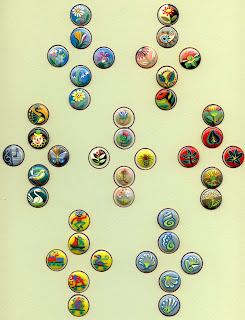These are small plastic
buttons designed and painted by Edith and Alan Brooks in England
Edith and Alan opened a “craft-workers” private business. Without advertising but through maintaining a high standard of workmanship, the Brooks gained recognition and sent buttons to many parts of the world. They had no interest in mass production. Just the 2 of them worked at a large table facing each other the design was applied using a fine sable brush “with points like needles” they painted the design straight on the button. They worked on six buttons at a time, sewed onto a card by Edith, Dab-dab-dab all the way down and then dab-dab-dab again all the way down-the same dab on each button. Thus the design grew
When American collectors became aware of the Brooks buttons they were imported from England in the 1960’s and 70’s
Edith and Alan opened a “craft-workers” private business. Without advertising but through maintaining a high standard of workmanship, the Brooks gained recognition and sent buttons to many parts of the world. They had no interest in mass production. Just the 2 of them worked at a large table facing each other the design was applied using a fine sable brush “with points like needles” they painted the design straight on the button. They worked on six buttons at a time, sewed onto a card by Edith, Dab-dab-dab all the way down and then dab-dab-dab again all the way down-the same dab on each button. Thus the design grew
When American collectors became aware of the Brooks buttons they were imported from England in the 1960’s and 70’s
The Brooks didn’t just paint buttons they both taught embroidery at college, they
sold their embroidery items, comb cases, spectacle cases and needle cases, they
also made brooches, penchants and earrings. Brooches were painted similar to
their buttons with tiny spangles sometimes embedded in the design. They made
delicate flower groups on mother of pearl to fit into antique brooches to
replace faded photographs of long dead relatives. Their items were decorated in
enamels on mother of pearl, wood, plastics and various other materials, but the
Brooks buttons are most sought after.
Both Edith and Alan
Brooks have passed
away, information about them
and the buttons can be found in National Button Society bulletins: February
1973, May and October 1989, December 1990 and December 1993 Just Buttons
magazine June 1964 and November 1964 also see Carol C.'s wonderful Brooks study pages at
CLICK ON IMAGE TO ENLARGE

This comment has been removed by a blog administrator.
ReplyDeleteThis comment has been removed by a blog administrator.
ReplyDelete